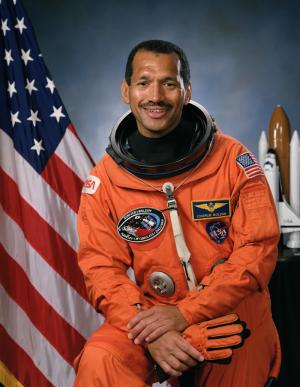Year born: 1946
Research Areas: Space Exploration, New Technology
"Our missions demand decades, even generational planning. But beyond technical milestones, the legacy we must pass on is inspiration."
Source: Space Generation Congress Speech

Early Life
Charles was born in South Carolina, USA. His parents were teachers. He wanted to join the Navy and after school applied to the United States Naval Academy. The government rejected his application. Charles has said he was rejected because he is Black. Charles did not give up and wrote to President Johnson (in power at the time) for support. He was then accepted into the Naval Academy. Charles got a degree in Electrical Science from the United States Naval Academy in 1968, and trained as a fighter pilot. He flew in more than 100 combat missions. He got a master’s degree in Systems Management from University of Southern California in 1977. In 1980, NASA selected Charles as an astronaut candidate.
Career Highlights
Charles piloted two space shuttle flights and commanded two others. Between 1986 and 1994 he spent over 680 hours in space. The astronauts carried out experiments, including studying the Earth’s atmosphere. Charles was the pilot on the mission that launched the Hubble Space Telescope.
In 2009, President Barack Obama promoted Charles to Administrator of NASA. This position reports directly to the President. The Administrator is NASA’s chief officer. They lead NASA to make sure it achieves its goals. Charles was the first non-white NASA Administrator. He was in this position until 2017.
During Charles’ leadership, NASA achieved many things. These included developing new technology for more environmentally friendly aeroplanes, starting work on super rockets for deep space exploration, and developing better spacecraft to take humans further into space.
NASA also achieved lots of science goals during Charles’ leadership. The Curiosity rover landed on Mars. The Juno spacecraft reached Jupiter. NASA also started work on the James Webb Space Telescope. This will replace the Hubble Space Telescope.
Legacy
Charles received many awards including the International Space Hall of Fame, Carl Sagan Award for Public Appreciation of Science, and the Nierenberg Prize for Science in the Public Interest. NASA sent a recording of Charles’ voice through space to the Curiosity rover on Mars. Curiosity then sent the recording back to Earth. His voice is the first to travel to another planet and back.
Other Interests
Charles likes to be active and enjoys running, swimming and American football.
